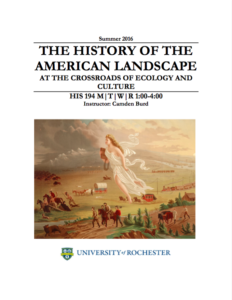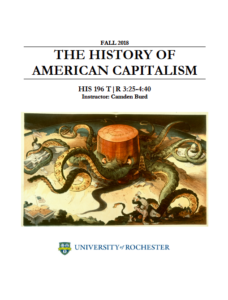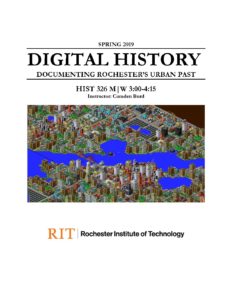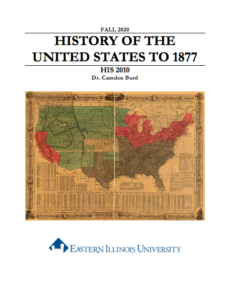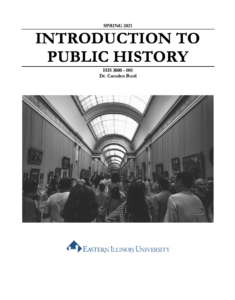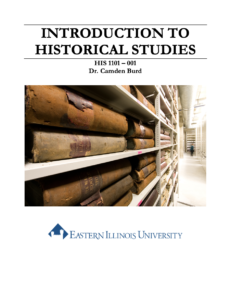INSTRUCTOR OF RECORD
The History of the American Landscape: At the Crossroads of Ecology and Culture
A history of the American landscape offers insights into the actions and beliefs of its inhabitants. Through a study of the landscape, we will uncover how past residents valued some aspects of the natural environment and ignored others. This course will also examine how cultural, racial, and social biases manifest themselves onto the earth’s service. In addition to a history of how men and women shaped the environment, this course explores the ways America’s unique environment shaped American culture itself. Overall, the course emphasizes the influence of “place” and environment in American history. In doing so, students will leave the classroom with a new perspective to understand modern environmental, and land-use, debates.
The History of American Capitalism
This course examines the trajectory of American capitalism alongside major moments in the nation’s history. We will explore how ideas of capitalism influenced the American Revolution, led to the outbreak of Civil War, and shifted during the Great Depression. We will discuss the political economy of capitalism and why the government advocates for certain products and services while outlawing or labeling others as taboo. We will read works by individuals who believed in the promise of capitalism alongside other writers who felt ignored and abandoned by the system. Over the course of the semester students will become aware that capitalism, in addition to a political and economic system, is a set of ideas and cultural attitudes about wealth, citizenship, identity, gender, and the use of natural resources.
Computers and their networks have fundamentally altered the ways that history is both produced and consumed. Sources in digital formats simultaneously present opportunities and challenges that force us to rethink what is possible in history. Doing history in a digital age forces us to engage with the issues and opportunities raised by such as topics as digitization and preservation, text mining, interactive maps, new historic methodologies and narrative forms, computational programming, and digital storytelling. In this course, we will investigate the landscape of digital history through an examination of Rochester’s rich cultural, social, and economic history. Students will use digital tools to document, collect, and share some aspect of Rochester’s history.
See examples of student work here.
This course covers various points of United States history from the colonial period to the Civil War and Reconstruction. We will read and discuss primary and second materials exploring colonial contest, Revolutionary politics and ideas, and the political struggles of the early-nineteenth century. In addition to a historical examination of key events and people, students will understand how colonists and early Americans valued religion, family, gender, race, and the economy.
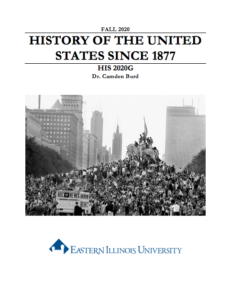 The History of the United States Since 1877
The History of the United States Since 1877
This course covers various topics of United States history from the era of Reconstruction through the modern day. We will read and discuss primary and second materials exploring the Reconstruction era, industrialization, progressivism, and the origins of our modern political landscape. In addition to a historical examination of key events and people, students will understand how Americans valued religion, family, gender, race, and the economy.
This course is a survey of Illinois history from pre-colonial to the present with an emphasis on Indian, French, British and American geo-political agendas. We will explore the Northwest Ordinance’s influence on the state’s development. Students will also example the tension associated with northern or southern cultural allegiances, rural versus urban economic and political power, and race and ethnic relations over time. In addition to readings and discussions, students will undergo original research and contribute to a digital history research project.
Introduction to Public History
What is a historian? Some people seem to think that being a historian means long hours in the archives, working in solitude, and writing books. While this is certainly true for some, many historians focus their energies outward. Using creative methods and innovate technologies, public historians translate historical knowledge for the general public. They also serve as record keepers for their communities where they collect, archive, and preserve information for future generations. Throughout the semester we will examine what it means to be a public historian. We will discuss how public historians navigate the challenges of their respective fields by grappling with the methodological issues and historical debates that underpin those professions. Students will meet with public history practitioners, test various digital tools used by those in field, and develop the presentation skills necessary to work with a public audience.
Introduction to Historical Studies
What do historians do? In this course students will learn about what makes history a “discipline” of study by exploring the various fields, methods, and skills of historical study. Students will also explore how historians use their unique skills in a range of professions. Finally, students will become acquainted with doing history at EIU by learning about campus resources for historians.
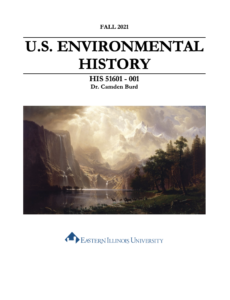 U.S. Environmental History (Graduate Seminar)
U.S. Environmental History (Graduate Seminar)
This seminar introduces students the field of environmental history with a special focus on the history of United States of America. Course readings will offer new interpretations of the nation’s history with a particular emphasis on the tangled relationship between humans and the natural world. Through readings and discussion, we will follow the development of the field and its broader significance in historical scholarship.
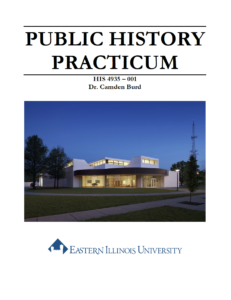
The public history practicum focuses on the practical study of public history through work in the field. Students enrolled in the practicum course will conceive, develop, and present an entire public history project that utilizes various forms of media. This course is intended to give students the hands-on experience necessary to be a successful public historian beyond the academy. During this semester students will focus on the regional history of the Works Progress Administration and its influence on local art. Students will research, design, and install an exhibit in the Tarble Arts Center.
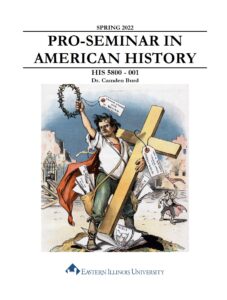 Pro-Seminar in American History (Graduate Seminar)
Pro-Seminar in American History (Graduate Seminar)
This seminar introduces students to the varied problems, debates, and historiographical trends in American history. Course readings will offer interpretations of the nation’s history by focusing o various topics, eras, and interpretative frameworks. As a result, students will participate in analytical reading, critical analysis, and expository writing. The course offers broad preparation for the MA comprehensive examination in the field of American History.
INDEPENDENT STUDY COURSES
The following courses have been designed alongside individual students based on their particular research and academic interests.
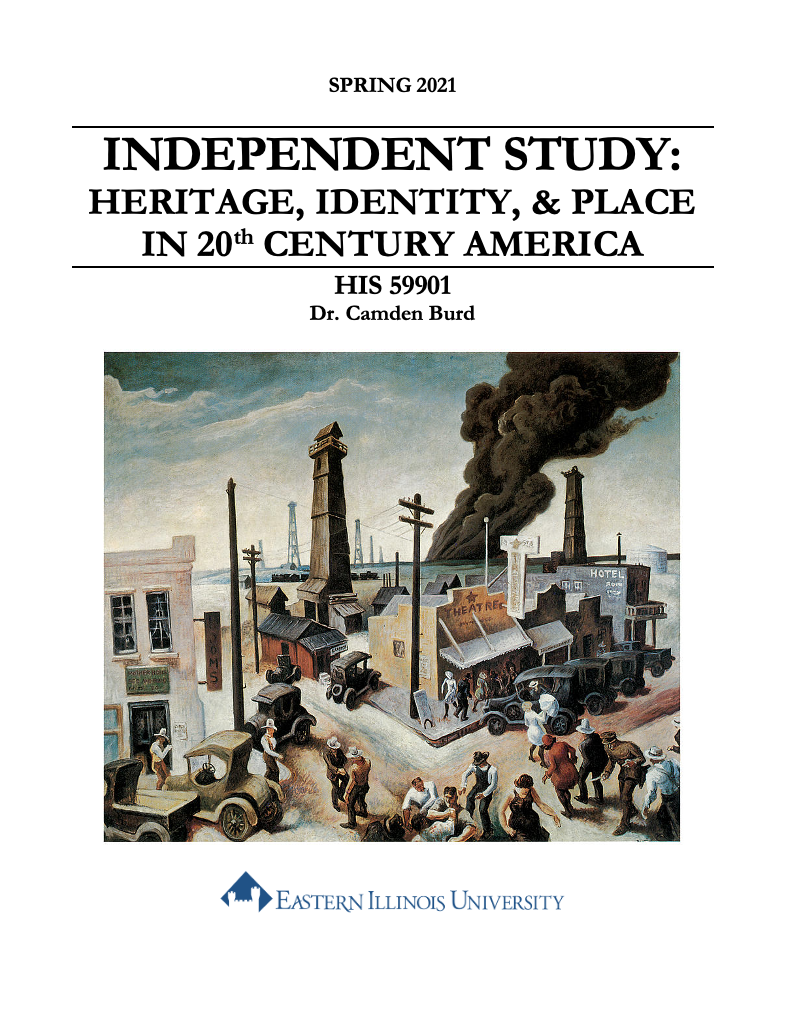 Independent Study: Heritage, Identity, & Place in 20th Century America (Graduate Seminar)
Independent Study: Heritage, Identity, & Place in 20th Century America (Graduate Seminar)
This independent study will examine the interrelated themes of heritage, identity, and place through American history with particular emphasis on 20th-century America. The readings compiled in this independent study are interested in several questions: How is heritage created? Who creates heritage? What is the relationship between heritage and identity? Who is left out of these cultural constructions? How are ideas of heritage and identity grafted onto physical space?
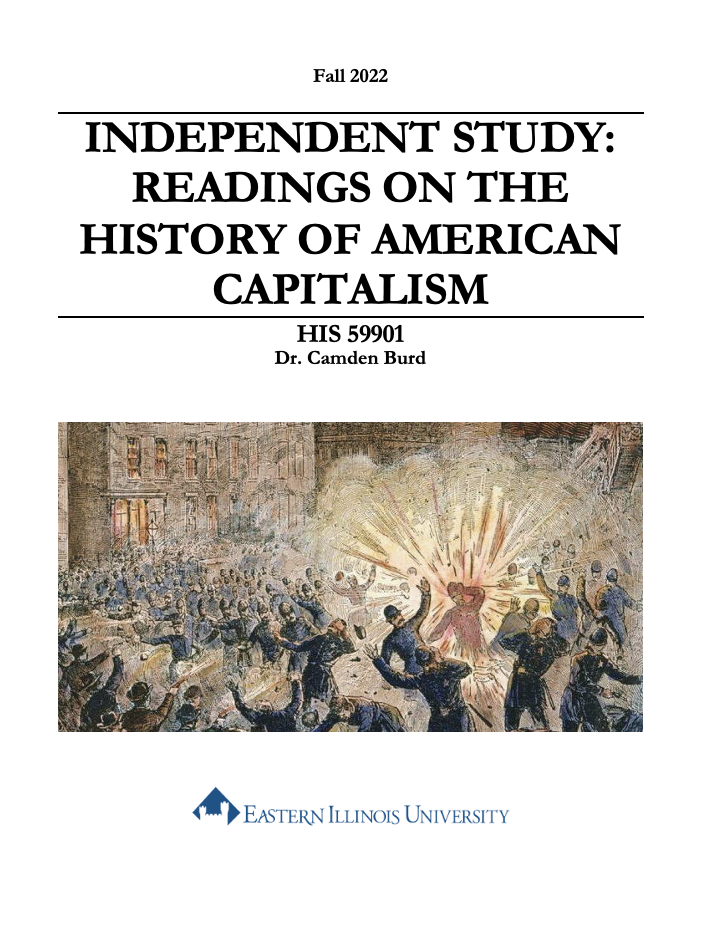 Independent Study: Readings on the History of American Capitalism (Graduate Seminar)
Independent Study: Readings on the History of American Capitalism (Graduate Seminar)
This independent study will examine the history of capitalism over the course of American history from the colonial era to the present day. In doing so, the students will both understand the ways in which this economic system developed, grew, morphed, and defined major social, economic, environmental, and political events of American history. This is a readings-based course that will involve weekly discussion. Additionally, the student will be required to submit a final historiographical essay at the end of the semester that examines important themes, debates, and directions of the field.
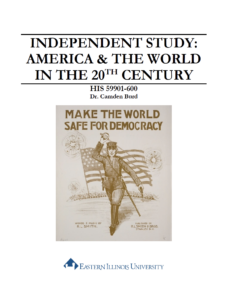 Independent Study: America and the World in the 20th Century (Graduate Seminar)
Independent Study: America and the World in the 20th Century (Graduate Seminar)
This independent study will examine the connected world of American politics and culture to broader international events and locales throughout the 20th century. The readings compiled in this independent study are interested in several questions: How have international events shaped American politics and culture? How have American policies and culture shaped international events? How does our understanding of 20th century American history change when we consider transnational and global influences? Collectively, the readings reveal a deeper trend in scholarship whose authors acknowledge the failure of considering American history with strict borders. Instead, all the readings come to understand that American history is shaped by transnational forces.
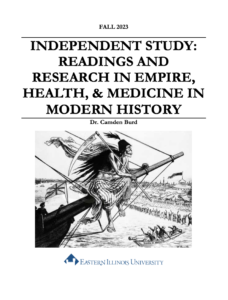 Independent Study: Readings and Research on Empire, Health, and Medicine in Modern History (Graduate Seminar)
Independent Study: Readings and Research on Empire, Health, and Medicine in Modern History (Graduate Seminar)
This independent study will explore the interconnected histories of empire, health, and health policy in modern history with a particular focus on the Atlantic World. Central questions to this course will be: How did the empire influence human health? How did the movement of people, ideas, and goods influence notions of health? In what ways does health policy reflect structures of empire?
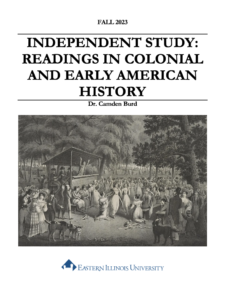 Independent Study: Readings in Colonial and Early American History (Graduate Seminar)
Independent Study: Readings in Colonial and Early American History (Graduate Seminar)
This independent study will examine the important works dealing with the history of colonial North American and the United States until the Civil War era. The goal of the class is to provide the student with a historiographical overview of works that have shaped historians’ understandings of the era.
